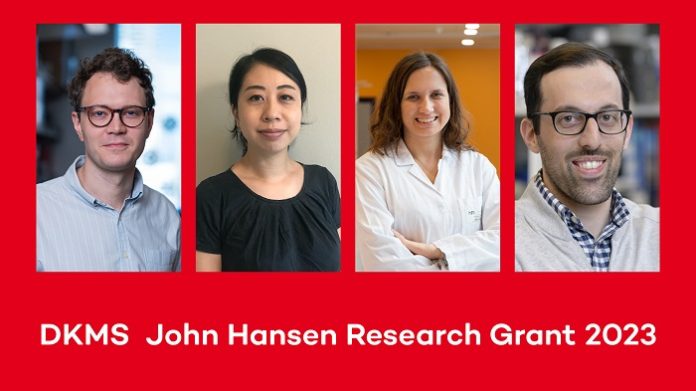
The DKMS foundation has awarded four young scientists with the DKMS John Hansen Research Grant for working on different topics to make blood cancer therapy more successful in the future.
The scientists are Ivan Cohen from the University of Pennsylvania, Eiko Hayase from the University of Texas MD Anderson Cancer Center, Andri Lemarquis from the Memorial Sloan Kettering Cancer Center in New York, and Eliana Ruggiero from the University Vita-Salute San Raffaele in Milan.
Every year, more than 1.2 million people worldwide are diagnosed with some form of blood cancer. The chances of survival are not always promising. In many cases, advanced therapeutic measures have to be taken, such as stem cell transplantation or, since a few years, CAR-T cell therapy. Unfortunately, even these often very effective therapies are not ideal. There are still patients who cannot be cured by any therapy in the long term, or for whom new side effects of the therapy limit the quality of life afterwards.
Fortunately, there are scientists around the world who are committed to improving therapies so that the chances of cures for blood cancer patients continue to increase. DKMS supports some of these researchers financially. This year, four scientists received the DKMS John Hansen Research Grant, which provides each awardee with a total of €240,000 for a time period of three years.
“We have elected four excellent young scientists as this year’s John Hansen Research Grant awardees. They all have the honorable goal of bringing hope and cure to patients around the world,” says Dr. Marcel van den Brink, chairman of the DKMS Medical Council. “Their projects address all kinds of current scientific questions in the field of blood cancer therapy. We are pleased to support them and wish them every success in their endeavors.”
Eiko Hayase and Andri Lemarquis are both working to improve allogeneic stem cell transplantation outcomes. However, they both take completely different approaches. Hayase seeks to combat the incidence of graft-versus-host disease, which continues to limit the success of allogeneic stem cell transplantation. In this context, she looks at the intestinal tract, where the disease often manifests. She investigates the influence of a strain of bacteria in the gut, Bacteroides ovatus, that is already known to have a positive effect on disease progression.
Lemarquis’s work focuses on thymic regeneration. After stem cell transplantation, immune reconstitution is of particular importance and is dependent on a functional thymus. He studies a specific type of T cell, called regulatory T cells, which are known to modulate the immune system. Regulatory T cells are recently shown to promote tissue regeneration and Lemarquis investigates whether these cells are also important for thymic regeneration. This knowledge could be used therapeutically in the future to achieve timely thymic renewal after stem cell transplantation to reduce the incidence of post-transplant infections and relapse.
Eliana Ruggiero and Ivan Cohen both aim to improve CAR-T cell therapy for hematological malignancies. Dr. Ruggiero’s research focuses on acute myeloid leukemia (AML). In particular, she searches for T cell receptors targeting the heterogeneous antigenic landscape of AML and aims to identify the changes occurring in the tumor compartment upon treatment with TCR-engineered T cells. The results of this project would help to generate novel combinatorial anti-tumor strategies.
Cohen, on the other hand, has already found a new target antigen with promising properties for CAR-T cell therapy in diffuse large B cell lymphoma. The antigen is present in malignant B cells and has only limited expression in normal B cells, which makes it different than the currently used targets for CAR-T cell therapy such as CD19 and CD22 which are also highly expressed in normal B cells. This project will develop a CAR-T cell therapy that targets only tumor cells while sparing healthy B cells, thus avoiding long-term severe immunosuppression.
The application period for the DKMS John Hansen Research 2024 Grant begins 1 August.
DKMS is an international non-profit organization dedicated to saving the lives of patients with blood cancer and blood disorders. Founded in Germany in 1991 by Dr. Peter Harf, DKMS and the organization’s over 1,000 employees have since pursued the aim of giving as many patients as possible a second chance at life.





